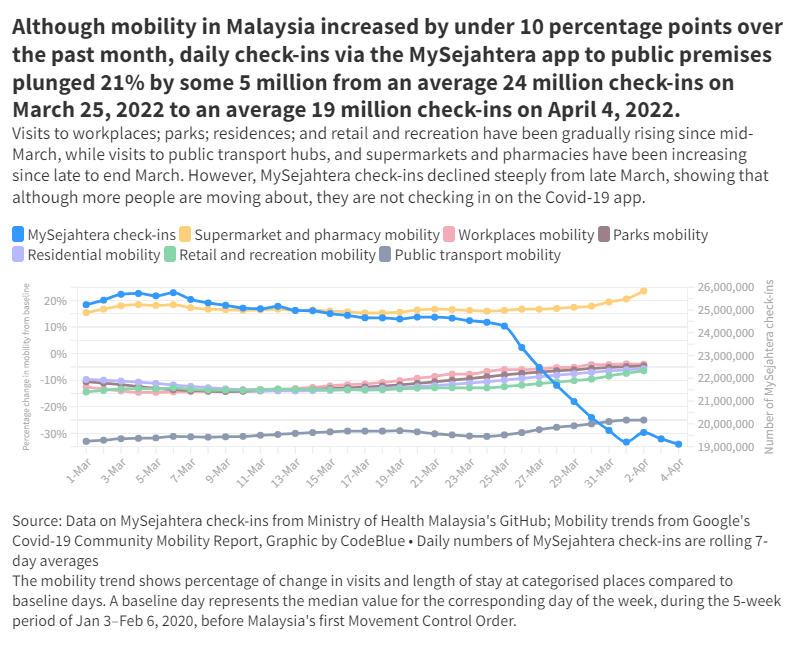KUALA LUMPUR, April 7 – Although human mobility has been gradually increasing in Malaysia as the country begins adjusting to living with Covid-19, check-ins to public premises via MySejahtera have plunged amid controversy surrounding the app.
Based on mobility data from Google – which tracks the change in visits and length of stay at certain places compared to a baseline from the corresponding day of the week, during the five-week period January 3 to February 6, 2020 – mobility trends in Malaysia across all tracked categories rose by less than 10 percentage points over the past month compared to the baseline.
However, ever since the MySejahtera scandal broke last March 26 following a Public Accounts Committee (PAC) report questioning ownership of the Covid-19 app that’s linked to a private company, daily MySejahtera check-ins to registered public premises, based on rolling seven-day averages, declined 21 per cent by some 5 million from an average 24.3 million check-ins on March 25 to an average 19.1 million check-ins on April 4.
This indicates that although more people are moving about or are visiting public areas more frequently, they are not checking in on MySejahtera.
Mobility trends related to workplaces; parks; places of residence; and retail and recreation (like restaurants, cafes, and shopping centres) rose by 8 percentage points from between -12 per cent and -14 per cent change on March 15 compared to the baseline, to between -4 per cent and -6 per cent change on April 2 compared to the baseline.
Mobility trends related to public transport hubs like underground, bus and train stations increased by 6 percentage points from -31 per cent change on March 24 compared to the baseline, to -25 per cent change on April 2 compared to the baseline.
This means that visits to and length of stay at these places increased in that period, although still lower than the January-February 2020 baseline before Malaysia’s first Movement Control Order (MCO).
Malaysia’s mobility trend for supermarkets and pharmacies – a category that includes food warehouses, farmers markets, and specialty food shops – increased by 9 percentage points from 15 per cent change on March 17 compared to the baseline, to 24 per cent change on April 2 compared to the baseline.
This indicates that the country saw increased visits in that period to supermarkets and pharmacies; over the past month, visits to these places also exceeded the January-February 2020 period.
Supermarkets and pharmacies were the only category of places that saw higher visits than in January-February 2020, compared to other places with visits still below the baseline.
Based on rolling seven-day averages, MySejahtera averaged about 19.1 million check-ins on April 4, the lowest in nearly eight months since August 21 last year.
Check-ins on the ubiquitous app that have been mandated at nearly public premise, even cemeteries, have been consistently dropping from a peak of an average 32.1 million check-ins last November 6. The highest-ever recorded daily check-ins on MySejahtera was on April 12 last year at 34.5 million.
However, the steep decline of five million daily MySejahtera check-ins since the last week of March exceeded a previous drop of about four million daily check-ins between January 31 and February 7 this year.
MySejahtera check-ins increased briefly on April 2 with an average 19.6 million check-ins, the day after international borders were reopened, but declined in subsequent days to an average 19.1 million check-ins on April 4.
The 21 per cent plunge in overall daily MySejahtera check-ins since late March was accompanied by a drop in unique accounts that checked in to premises on the app, indicating that fewer people are using MySejahtera to officially register their visits to public places – not just that the same individuals are checking in less frequently.
The number of unique MySejahtera check-ins fell 23 per cent by 2.2 million from an average 9.6 million on March 25 to an average 7.4 million on April 4.
Neither the Ministry of Health (MOH) nor MySejahtera’s official website have released any news regarding MySejahtera being under maintenance, which excludes this possibility for a factor in the decline in check-ins.
Although Health Minister Khairy Jamaluddin recently reassured the public that the government owns the personal data and modules in MySejahtera, and the brand, the public may remain skeptical in view of the enormous drop in daily overall and unique check-ins.
Parliament’s PAC is investigating the development and procurement of MySejahtera, calling up Khairy on the first day of hearings on April 14.








